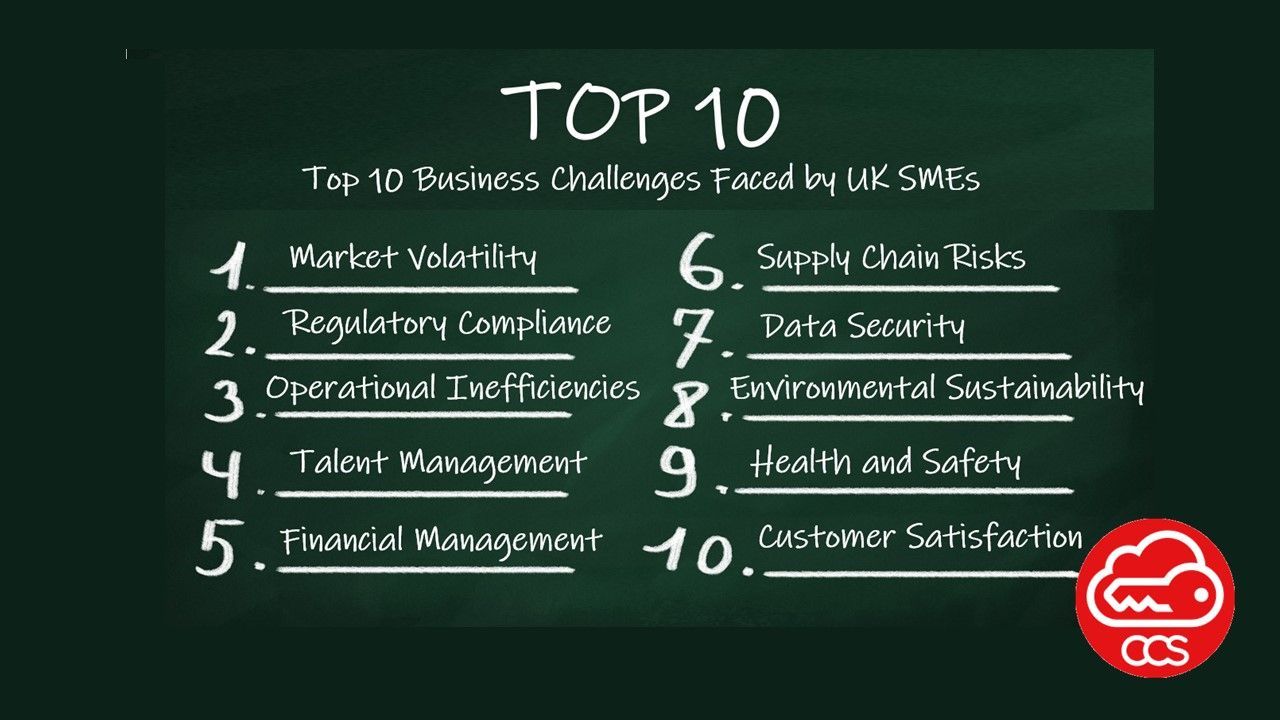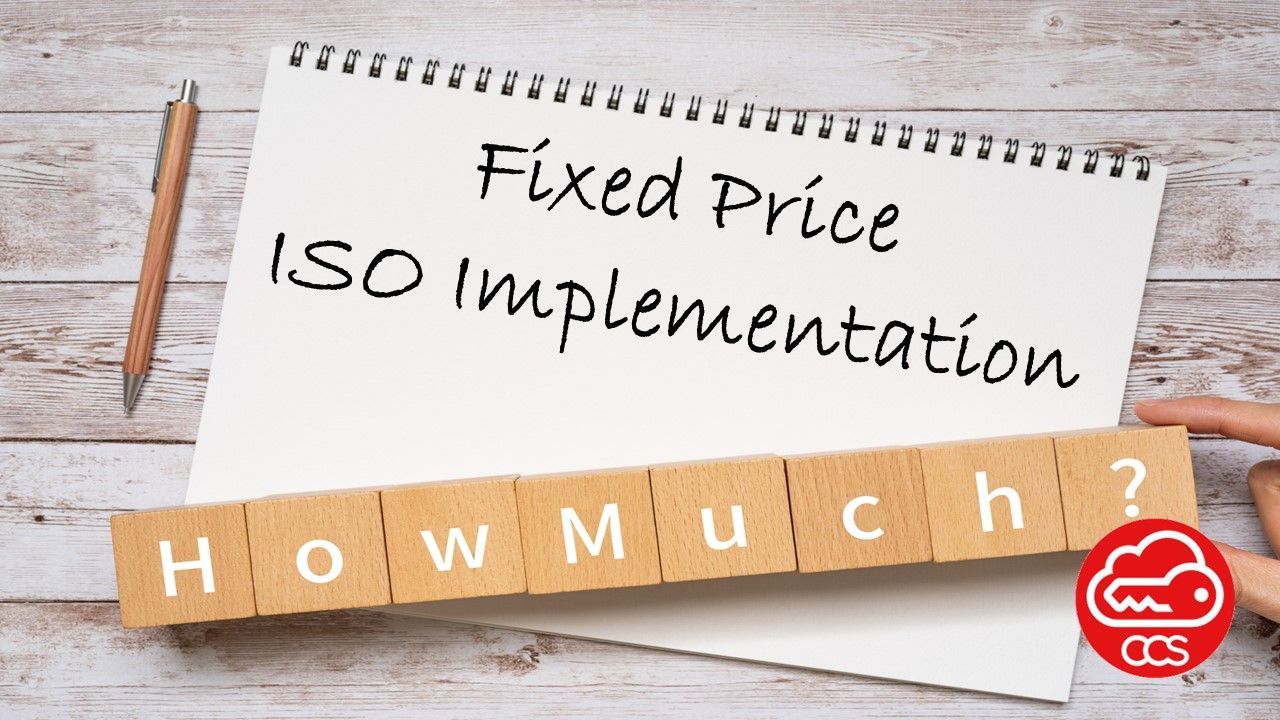Top 10 Business Challenges Faced by UK SMEs
and How ISO Standards Can Help.
In today's competitive market, small and medium-sized enterprises (SMEs) in the UK face numerous challenges that can impact their growth and success. These challenges range from market volatility and regulatory compliance to operational inefficiencies and cybersecurity risks. To overcome these hurdles and thrive in the business landscape, SMEs can leverage ISO standards, which provide internationally recognised frameworks and best practices.
In this article, we will explore the top 10 business challenges faced by UK SMEs and how ISO standards can address them effectively.
- Market Volatility:
- Fluctuations in the market can pose significant challenges for SMEs.
ISO 22301:2019 Business Continuity Management System (BCMS)
enables organisations to identify potential risks, develop effective business continuity plans, and ensure the smooth operation of critical processes during disruptions. Additionally,
ISO 9001:2015 Quality Management System can help SMEs streamline processes, enhance customer satisfaction, and drive continuous improvement in response to market changes.
- Regulatory Compliance:
- Complying with complex regulations can be overwhelming for SMEs.
ISO 9001 Quality Management System helps SMEs establish robust processes to meet regulatory requirements, enhance customer satisfaction, and drive continuous improvement.
ISO 14001 Environmental Management System assists SMEs in developing sustainable practices and complying with environmental regulations.
ISO 45001 Occupational Health and Safety Management System
(OH&S) ensures compliance with health and safety regulations, safeguarding employees' well-being.
- Operational Inefficiencies:
- Inefficient processes can hamper productivity and hinder growth.
ISO 9001:2015 Quality Management System
provides a systematic approach to improve operational efficiency, streamline processes, and enhance customer satisfaction.
ISO 20000 Information Technology Service Management (ITSM) assists SMEs in optimising IT service delivery and management processes, improving overall operational efficiency.
- Talent Management:
- Attracting and retaining skilled employees is crucial for SMEs.
ISO 9001:2015 Quality Management System can help SMEs establish robust training and development programs to nurture employee skills and ensure competence.
- Financial Management:
- Managing finances effectively is vital for SMEs' sustainability.
ISO 9001 Quality Management System can help SMEs establish strong financial controls and ensure accurate financial reporting.
ISO 27001 Information Security Management System (ISMS) provides guidelines for protecting financial data from cybersecurity risks, safeguarding the integrity and confidentiality of financial information.
- Supply Chain Risks:
- Supply chain disruptions can have a severe impact on SMEs.
ISO 22301 Business Continuity Management System (BCMS) can help SMEs identify and manage risks, ensuring the resilience of the supply chain.
- Data Security:
- Protecting sensitive data from cyber threats is a top concern for SMEs.
ISO/IEC 27001 Information Security Management System (ISMS)
helps SMEs establish a robust framework to identify, manage, and mitigate information security risks. ISO 27001 also ensures the confidentiality, integrity, and availability of critical business information.
- Environmental Sustainability:
- Sustainability is increasingly important for SMEs.
ISO 14001:2015 Environmental Management System provides a framework for SMEs to develop and implement environmental strategies, reduce their ecological footprint, and demonstrate commitment to sustainable practices. Additionally,
ISO 50001 Energy Management System helps SMEs establish energy-efficient processes, reduce energy consumption, and lower greenhouse gas emissions, contributing to environmental sustainability.
- Workplace Health and Safety:
- Ensuring a safe working environment is crucial for SMEs.
ISO 45001 Occupational Health and Safety Management System (OH&S) provides a framework to manage health and safety risks, improve employee well-being, and comply with legal obligations. By implementing ISO 45001, SMEs can create a culture of safety, reduce workplace accidents, and protect the health of their workforce.
- Customer Satisfaction:
- Delivering excellent customer experiences is a key differentiator for SMEs.
ISO 9001 Quality Management System enables SMEs to establish robust processes for understanding customer needs, addressing their concerns, and continuously improving customer satisfaction.
The challenges faced by UK SMEs in today's market are diverse and demanding. However, ISO standards provide valuable tools and frameworks to address these challenges effectively. By implementing relevant ISO standards such as ISO 9001, ISO 14001, ISO 45001, ISO 22301, ISO 50001, ISO 20000, and ISO/IEC 27001, SMEs can enhance their operational efficiency, manage risks, ensure compliance, and drive customer satisfaction.
Embracing ISO standards empowers SMEs to build robust systems and processes, fostering resilience, sustainability, and success in a competitive business landscape.
It's important for SMEs to assess their specific needs and requirements and determine which ISO standards are most relevant to their industry and business objectives.
By adopting these standards and integrating them into their operations, UK SMEs can gain a competitive edge, improve their resilience, and thrive in today's dynamic market environment.




